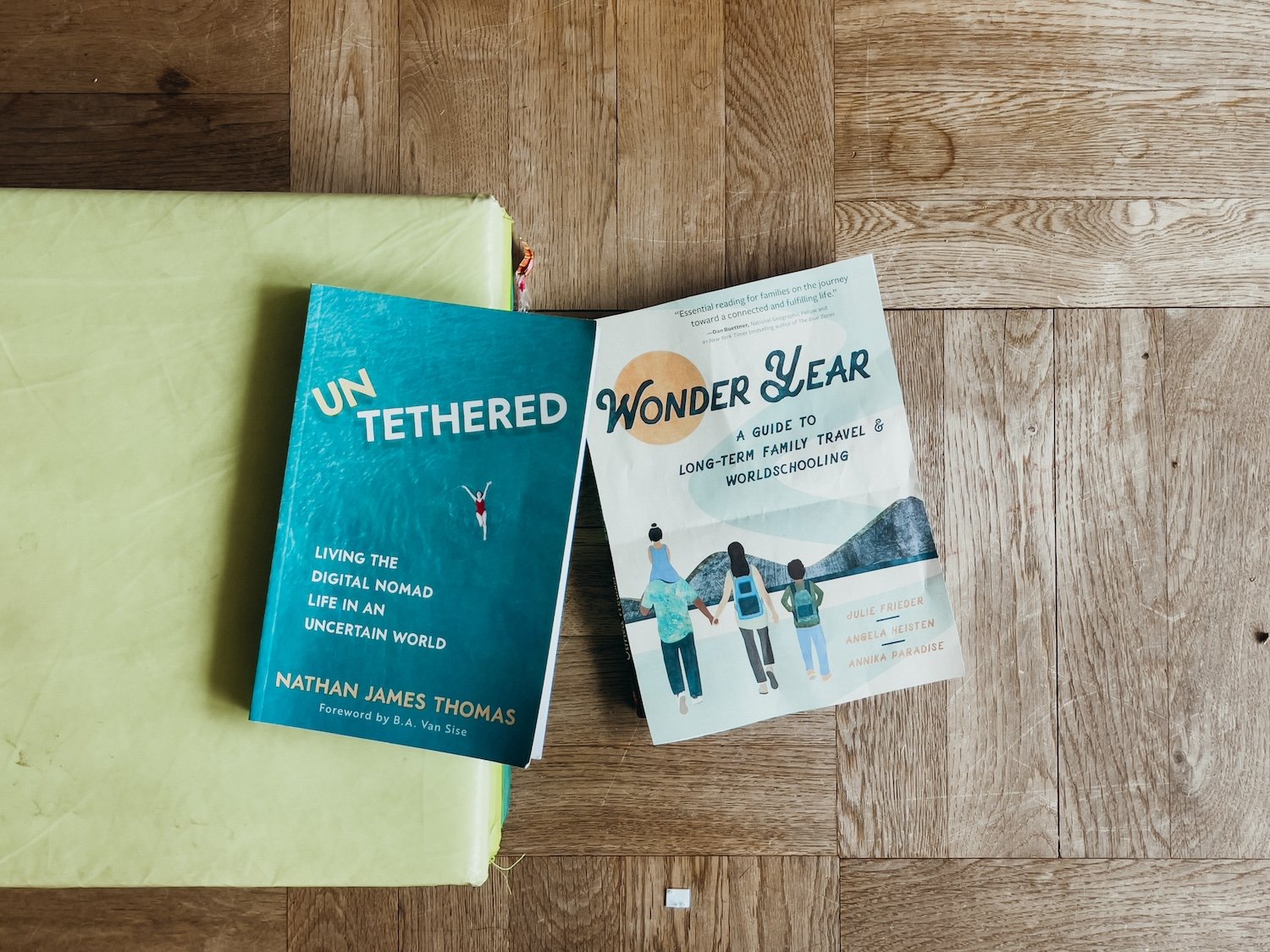Wonder Year and Untethered: Two Books for the Long-Term Travel Curious
Seriously interested in extended family travel or embarking on a location-independent life? These books will simultaneously stoke your wanderlust and guide you toward making it a reality.
Our blog is 100% reader-supported. When you buy through links on our site, we may earn an affiliate commission. Thanks!
Have you and your family ever considered taking a wonder year?
Maybe you don’t even know the term. Maybe you already have one foot out the door. Or perhaps the whole concept seems a bit too pie-in-the-sky. Whatever your stance, Wonder Year: A Guide to Long Term Family Travel and Worldschooling, written by co-authors Julie Frieder, Angela Heisten, and Annika Paradise breaks down the steps of worldschooling in great detail and builds a pretty convincing argument for embarking on this type of educational adventure.
Written collaboratively by three women who have embraced the worldschooling philosophy in their own lives, Wonder Year starts off by describing this approach as a “season of discovery. It is an experience of being in motion with your family and adopting a mindset of growth and curiosity.” The term refers more to an attitude toward travel than a required length of time or distance away from home. In short, “Wonder Year = long-term family travel + worldschooling.” The book goes on to outline how to plan for, carry out, and return from a wonder year stint, including all the nitty gritties, from which medical supplies to pack to how to design – and then redesign, when the going gets tough – a worldschooling curriculum. Because the authors are the first to admit that not everything goes as planned on the road.
This theme of leaving “space for spontaneity” provides a welcome counterbalance to the long lists of considerations to keep in mind. On one hand, readers are reminded to slow down and talk to locals rather than speeding through a destination in order to check off as many bucket list items as possible. On the other, they are given thorough breakdowns of how to manage a budget on the road and which insurances should be suspended or double-checked. The book zig zags throughout between incredibly well-researched practical advice and reminders to slow down and smell the flowers, all culled from real-life experience.
The writing really comes alive in the “Notes from the Road” scattered throughout the text in which the authors and other members of their families share firsthand accounts of specific moments from their wonder years. These vignettes capture a range of experiences, from observing the birth of a baby impala in Botswana to reacting to a vicious sand mite attack in the Florida Keys. Whether they tell a negative or positive story, each of these candid snapshots illustrate how invaluable it can be to learn from direct observation of and interaction with the world around us.
While enrolling one’s children in the school of life has its undeniable rewards, worldschooling may not be for everyone. The authors don’t seem to want to convince everyone in the world, either. For those already curious, perhaps just waiting for a little encouragement to take the plunge, this book fits the bill. From the initial phases of planning to alternative approaches to schoolwork all the way through to “reentry,” these women know their stuff. But for those who might not have the ability to work from the road, take a sabbatical, or leverage other assets while away, the book doesn’t perform any miracles. If anything, they do acknowledge the privileged backgrounds that have enabled them to provide their family with such an opportunity. They even touch on how taking a wonder year can teach kids to recognize their own privilege and instill in them the desire to give back to communities in need.
In this and many other ways – including tips on sustainable and off-season travel, encouraging participation in citizen science, engaging with local communities, et al – the book aligns with many of the principles we aspire to here on the Heyterra platform. Ultimately, it might come as a handy how-to for worldschoolers in the making (in which case, we recommend getting into it well before departure), or it might just offer inspiration for those seeking tools for more meaningful family travel during school breaks. Either way, it weaves together a beautiful tapestry of case studies on how to glean the most knowledge out of the world around us without destroying it as we go.
Untethered by Nathan James Thomas – Bringing Remote Work Back Down to Earth
The terms “Wonder Year” and “Digital Nomad” might seem to contradict each other when taken at face value, but the latter is essentially what many parents become when embarking on the former. For moms and dads intrigued by the idea of worldschooling but who don’t have a clearcut plan for how to keep earning money from the road, Untethered – a new guidebook to “living the digital nomad life in an uncertain world” – may hold some answers.
The image of a digital nomad most often portrayed in popular media involves a tropical setting with an open laptop, an uncapped beer, and waves crashing in the background. This is exactly the myth that author Nathan James Thomas sets out to bust in Untethered. In fact, an overarching theme of the book is how this seemingly laidback lifestyle actually requires dedication, discipline, and preparation. He even argues that this type of work should take place in boring, isolated spaces so that when it is time to hit the proverbial beach, remote workers can actually enjoy the experience of being in a new place.
There are some overlaps between this book and Wonder Year, and some sections here that won’t apply to parents, but with its clearly organized structure, Untethered is easy to navigate according to individual needs. Readers that enjoy the candid case studies in Wonder Year might also appreciate the nuggets of wisdom shared by a cross-section of personalities in the “Meet the Nomads” profiles at the end of each chapter. But, with plenty of tips spread throughout its pages, Untethered definitely merits a full reading.
What Thomas explains particularly well is the breakdown of different models of remote jobs, from freelancing to full-time employment. By laying out multiple realistic paths to transitioning from in-person to mobile work, he dismantles the notion that the digital nomad lifestyle is reserved for charismatic influencers and hedge fund kids and replaces it with the profile of a responsible and dedicated, if travel-addicted, remote worker.
Early on in the book, Thomas pokes a bit of fun at a guy whose presentation in a bar about how to be a digital nomad he once attended. This guy’s schtick was full of sound bites but devoid of substance. Untethered, with its light conversational tone and the occasional swear word, also feels at times like a conversation being held between strangers over a few drinks. But behind Thomas’ words lies far more than fluff. The way he shares his real-world experience and well-communicated advice is designed not only to inspire, but actually to help others get closer to the digital nomad dream, whatever that might mean to them.







